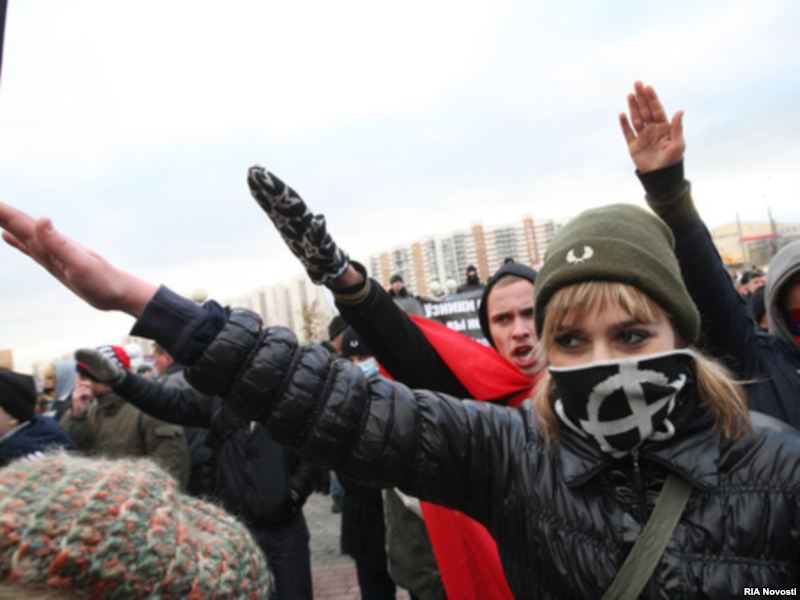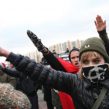
The Kremlin Struggles to Contain Ethnic Hatred
Publication: Eurasia Daily Monitor Volume: 8 Issue: 198
By:

On November 4, Russia’s official National Unity Day holiday, Russian nationalists of differing creeds (about 40 grassroots nationalistic organizations in total) have been allowed by the authorities to stage their traditional annual Russian March (Russky Marsh). The organizers hope to attract some 20,000 to 25,000 participants. Moscow city hall refused to permit the Russky Marsh and subsequent rally in the center of town, but agreed to move it to the outskirts of the city (Interfax, October 26).
Alexei Navalny, 35, a highly popular opposition blogger and anti-corruption campaigner has joined the organizing committee of this year’s Russky Marsh. Navaluy has a previous nationalistic record: in 2007 he was expelled from the liberal Yabloko Party for attending that year’s Russky Marsh and advocating closer ties with nationalist antigovernment groups (The Moscow News, October 21). In 2007 Navalny was a virtual unknown, while today he is one of the most familiar names in the Russian Internet community. The political influence of Russian nationalists has equally much increased after the mass riots in the center of Moscow last December in the Manezh Square close to the Kremlin when thousands of teenaged nationalists displayed en masse Nazi salutes, yelled “Russia for Russians,” “Kill, Kill” and “Moscow for Muscovites,” attacked non-Russian looking pedestrians and clashed with riot police that seemed to be reluctant to take affirmative action to restore order. This riot rattled the authoritarian Russian regime, whose legitimacy (as in any autocracy) is based not on election results, but on total control and the effective suppression of public opposition (EDM, December 16).
The pretext for the riots was a street brawl on December 6, 2010 between Moscow soccer club FC Spartak fans and migrants from the North Caucasus known in Russia as “Caucasians” – people representing different ethnic groups from the North and South Caucasus. Spartak fan Yegor Sviridov, 28, was killed, allegedly by Aslan Cherkesov, 26, of Kabardino-Balkaria, using a legally owned rubber bullet pistol. Last week a jury in Moscow by majority vote found Cherkesov guilty of premeditated murder and five other young “Caucasians” that took part in the brawl were found guilty of “hooliganism” and “causing insignificant body injuries.” The prosecutor has demanded that Cherkesov should spend 23 years in a strict security prison for premeditated murder and the other five “hooligans” can expect eight years in prison. Cherkesov and the other five “Caucasian” defendants have already spent almost one year in pre-trial prison custody. Their sentencing is scheduled for October 28 (Interfax, October 25).
The overly harsh treatment by the Moscow court of the “Caucasians” clearly reflects the desire of the authorities not to provide any new pretext for more nationalistic rioting and at the same time it indicates the widespread dislike of everything connected with the Caucasus within Russian society, law enforcement and judiciary. Recent opinion polls show growing nationalism engulfing Russia: some 35 percent of Muscovites support the nationalistic message of the Russky Marsh, while 47 percent of Russians believe the main source of nationalism “is the outrageous behavior of the representatives of other ethnicities.” Some 52 percent believe nationalistic feelings are becoming more widespread (Kommersant, October 25).
On October 22 at a nationalistic rally in Moscow, Navalny and liberal opposition leader Vladimir Milov, 39, (former deputy energy minister in 2002) jointly protested against the massive subsidizing of the ethnic North Caucasian republics under the slogan: “Stop feeding the Caucasus.” Milov and Navalny insisted massive federal subsidies are misspent in the North Caucasus notorious for widespread corruption and investing billions into building European-class mountain ski resorts is senseless in a region with continuing Islamist insurgency, where tourists are often kidnapped or murdered. The opulent lifestyle and exotic expenses of Chechen strongman Ramzan Kadyrov were attacked (Nezavisimaya Gazeta, October 24).
Russian nationalism is on the rise and has a potential to seriously challenge Vladimir Putin’s regime. But the nationalistic movement is splintered into multiple factions and does not have any clear leader. Officially the most prominent nationalistic politician is the flamboyant outspoken extremist Vladimir Zhirinovsky, 65, whose Liberal-Democratic Party has had a faction in all Russian Dumas’ since 1993. Zhirinovsky has managed to capitalize on growing Russian nationalistic sentiment, but in the Duma has obediently followed the Kremlin’s political line. Zhirinovsky seems to have been granted by the Kremlin something amounting to an official “license” to be an outspoken nationalist and capture the nationalistic vote and effectively neutralize it in day to day political wrangling (Nezavisimaya Gazeta, October 26).
Hardcore nationalists do not consider Zhirinovsky to be their representative, but Navalny and Milov equally do not seem to fit as they seem too liberal. Another flamboyant nationalistic figure Dmitry Rogozin has been kept beyond Russia by the authorities as the permanent representative to NATO. Russian nationalism is seen as a serious threat. It runs against Putin’s core imperial strategy of rebuilding a Eurasian superstate, in which all former subjects of the old Soviet Union will be at home: “Caucasians” and people from Central Asia (EDM, October 6).
President Dmitry Medvedev has pointedly attacked the slogan “Stop feeding the Caucasus,” insisting that it could lead to “Russia falling apart” as the USSR did in 1991. Medvedev stressed: “Our Caucasian republics are a fortress against international terrorism, strange as it may sound” and must be supported, while “Caucasians” within Russia proper “must behave themselves.” According to Medvedev, “our strength lies in our unity, and we must not allow anyone to destroy it” (www.kremlin.ru, October 20). A nice slogan, but it is not so inspiring for a rapidly growing number of Russians.




